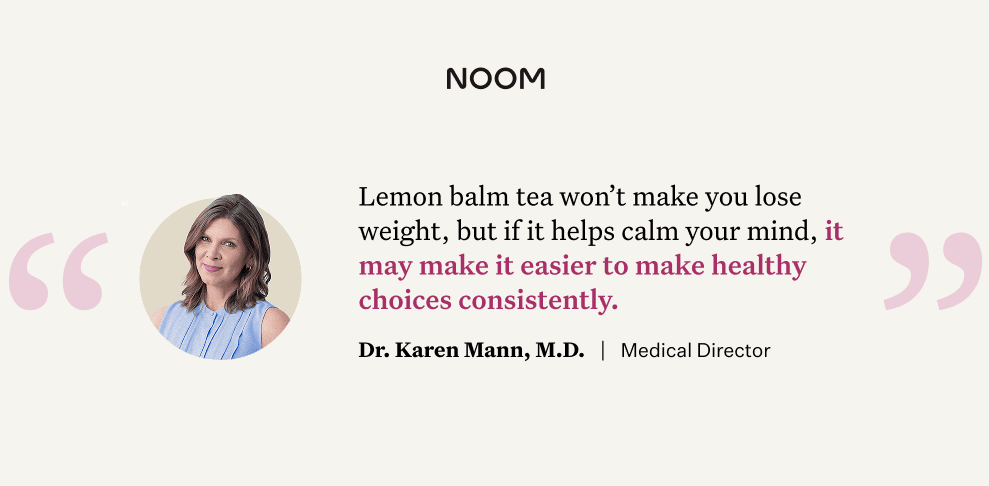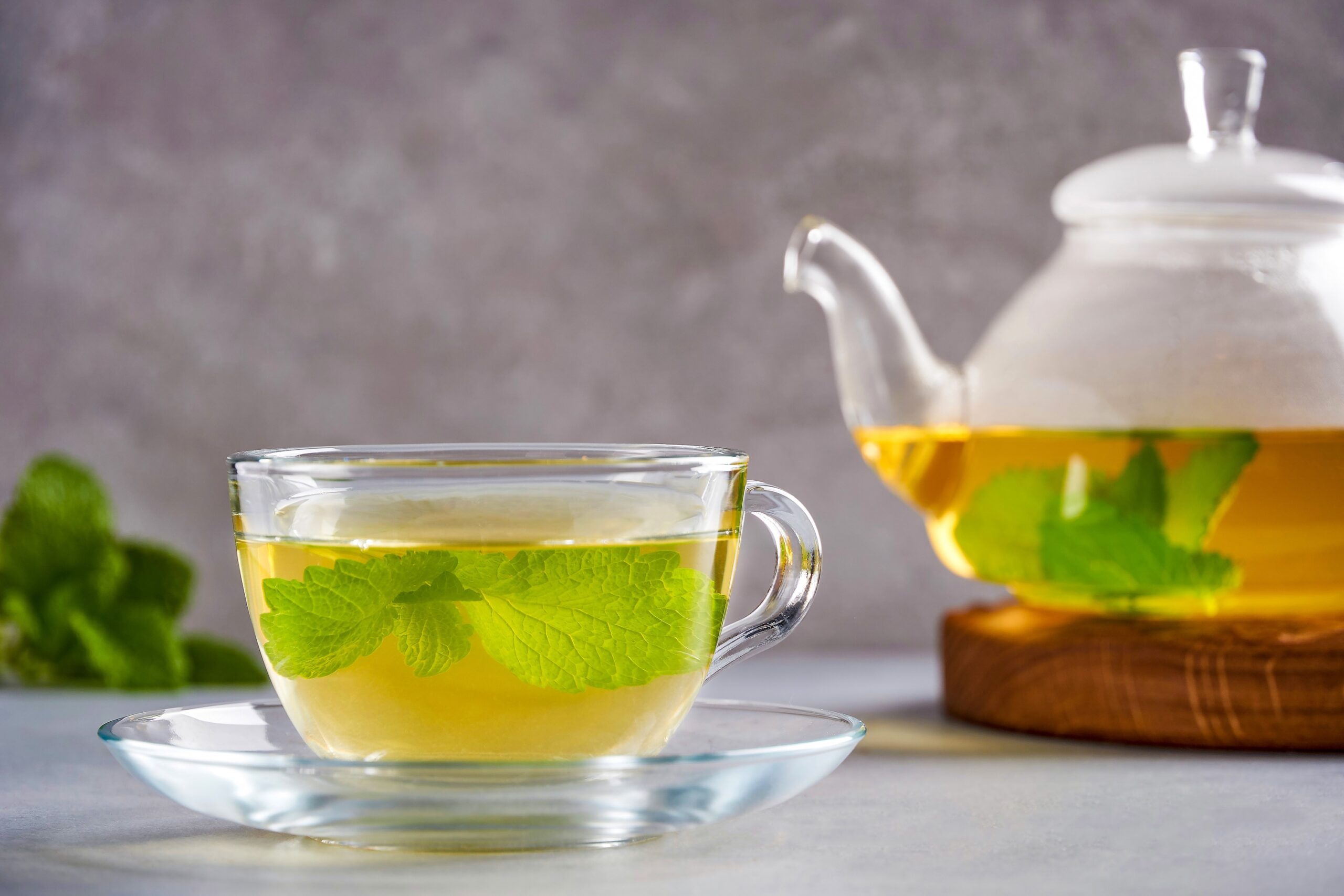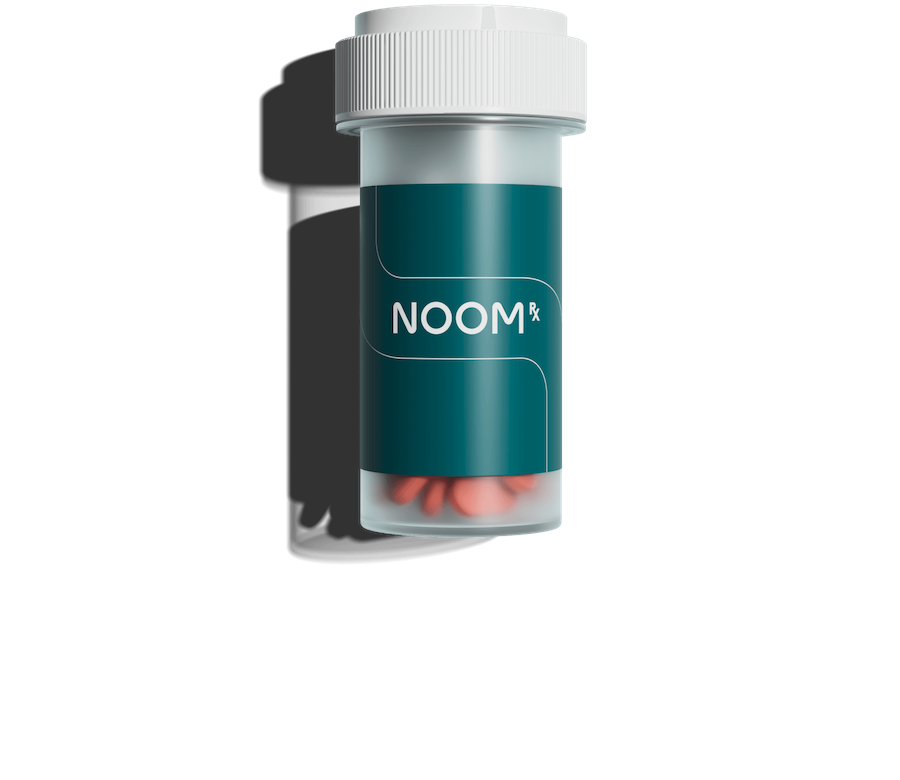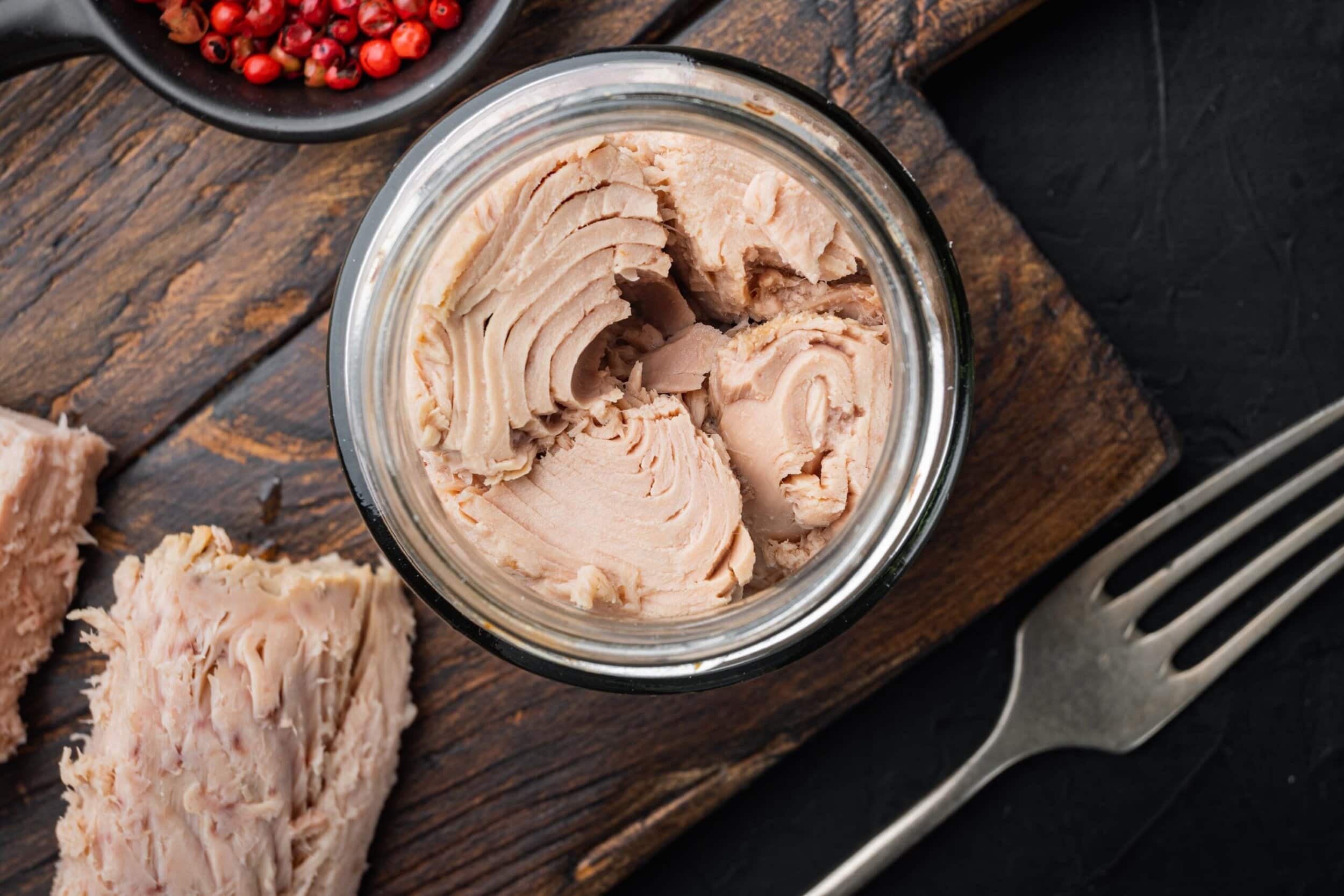What you’ll learn:
- Lemon balm tea is a centuries-old herbal remedy valued for its calming and stress-relieving properties, not a quick fix for weight loss.
- Scientific evidence does not support the claim that it directly boosts metabolism or suppresses appetite.
- While lemon balm tea won’t cause weight loss on its own, its ability to reduce stress may indirectly support healthier eating habits.
Sometimes, trending wellness drinks are complex blends of herbs, powders, and juices—think the “cortisol cocktail” or “natural Mounjaro.” Other times, they’re a modern revival of a time-tested remedy.
Lemon balm tea, an herbal brew with a light, citrusy flavor, falls into the latter category. Made from the leaves of the lemon balm plant, it’s been cultivated for more than 2,000 years and valued for its calming, digestive, and stress-relieving properties.
Now, it’s gaining attention for another potential benefit: weight loss. We’ll explore what lemon balm tea is, the claims about its role in weight loss and other health benefits, and what current science actually says. Plus, we’ll get experts to weigh in on whether lemon balm tea is safe.
Why is lemon balm tea so popular?
Lemon balm has been valued in many cultures for centuries, used in teas, tinctures, and herbal remedies to calm the mind, support digestion, and promote better sleep. Native to the Mediterranean and parts of Asia, it spread across Europe and beyond, becoming a staple in traditional medicine systems worldwide.
Today, lemon balm remains a staple in traditional herbal medicine for its lemony flavor and potential health benefits. It’s commonly used in teas, tinctures, essential oils, and other herbal preparations.
Here’s what people say it can do and what the research shows:
- Helps you feel calmer: Studies have found that lemon balm can help reduce feelings of anxiety and promote a sense of calm. One study found that people who took lemon balm extract in water reported greater calmness and reduced alertness compared to a placebo.
- Supports better sleep: Poor sleep can affect everything from mood to appetite regulation, and lemon balm is often used in herbal blends designed to support rest. In one study, people with mild sleep problems who took a standardized lemon balm extract reported improvements in the quality and duration of their sleep.
- Soothes the stomach: Lemon balm tea is often enjoyed after meals because it may help with mild digestive discomfort. It’s believed to relax the muscles of the digestive tract, which could ease gas, bloating, or indigestion.
- Protects your cells: Lab studies have found that lemon balm contains compounds like rosmarinic acid and flavonoids, which act as antioxidants. These substances may help protect cells from damage caused by free radicals—unstable molecules linked to aging and chronic disease.
- May fight certain viruses: Early research suggests that lemon balm extracts may have mild antiviral effects against specific viruses, such as herpes simplex virus, when applied topically in creams or ointments. This antiviral effect has not been proven from simply drinking lemon balm tea.
Does lemon balm tea help with weight loss?
Part of the recent surge in lemon balm tea’s popularity comes from social media. Videos on platforms like TikTok highlight its calming, digestion-friendly qualities and claim it may help with weight management. While there’s no direct evidence that it causes weight loss, experts note that its potential to lower stress and improve sleep—both linked to better eating habits—make it a gentle, caffeine-free option for people looking for small, manageable changes. Let’s take a close look at these claims:
Claim 1: Lemon balm tea helps you lose weight
Verdict: ❌ False.
There’s no scientific evidence that lemon balm tea directly causes weight loss. It may indirectly help with healthy lifestyle habits that support weight management by promoting relaxation, aiding sleep, and soothing digestion, but it’s not a fat-burning drink. Sustainable weight loss still depends on a balanced diet, regular physical activity, quality sleep, and stress management.
“There isn’t a tea or food that will be the sole driver of weight loss. Your overall dietary patterns and consistent healthy habits are what truly make a difference,” says Dr. Karen Mann, MD, Medical Director at Noom.
Claim 2: Lemon balm tea boosts metabolism
Verdict: ❌ False.
While some people suggest lemon balm tea can “rev up” your metabolism, there’s no credible human research showing it increases calorie burn, fat oxidation, or thermogenesis. Laboratory studies have examined lemon balm’s plant compounds for other health effects, but none have demonstrated a direct, measurable impact on metabolism in people.

Claim 3: Lemon balm tea suppresses appetite and reduces cravings
Verdict: ❌ False.
Some early lab studies and anecdotal reports suggest lemon balm’s natural compounds may influence brain chemicals linked to mood and possibly appetite. But, no high-quality human trials confirm that drinking lemon balm tea reduces calorie intake, changes hunger hormones, or leads to weight loss. Any appetite effects reported are likely subtle and inconsistent.
Claim 4: Lemon balm tea reduces stress and emotional eating
Verdict: ✅ True—indirectly.
This is where lemon balm has the most scientific support. Multiple studies have shown it can help people feel calmer and less anxious. This relaxing effect is thought to help the body handle stress better, which may reduce stress-related eating. Since high stress can trigger cravings for calorie-dense comfort foods, lowering stress could indirectly support weight management.
“When you reduce stress, you often reduce the ‘mindless’ eating that can creep in late at night or during a tough day,” says Dr. Mann. “Lemon balm tea won’t make you lose weight, but if it helps calm your mind, it may make it easier to make healthy choices consistently.”
Claim 5: Lemon balm tea improves digestion and eases bloating
Verdict: ✅ True—for comfort, not fat loss.
Lemon balm is traditionally used to soothe the stomach, and research supports its ability to help with mild digestive discomfort, such as gas and bloating. This may make you feel less bloated, but it does not cause fat loss. Still, feeling physically comfortable after meals can make it easier to maintain healthy eating habits.
How to make lemon balm tea
Preparing lemon balm tea can be done with fresh-picked leaves, dried loose leaves, or pre-bagged tea from the store. Most recipes call for steeping the leaves in hot (but not boiling) water for about 5–10 minutes, allowing the plant’s natural compounds to infuse into the liquid.
Different ways to make lemon balm tea:
- Fresh loose leaves – Rinse well to remove dirt or insects, then gently bruise the leaves between your fingers to release their natural oils before steeping. Place in a tea ball or infuser for easy cleanup, or strain them out after brewing.
- Dried loose leaves – Measure the desired amount into a tea ball, infuser, or directly into your cup or teapot. Steep, then strain if not using an infuser.
Pre-bagged tea – Place a tea bag in your cup, pour over hot water, and steep according to the package directions. - For an iced version, brew as usual, then chill and serve over ice with lemon and mint.
No matter which form you use, the finished brew has a light, lemony flavor with a hint of mint.
Some people customize lemon balm tea with add-ins for extra flavor or potential health benefits:
- Lemon slices can enhance the citrus aroma and add vitamin C.
- Fresh mint will add a cooling sensation and may boost digestive support.
- Honey for sweetness and throat-soothing properties.
- Chamomile to help with relaxation.
- Ginger adds a warming twist and possible digestive benefits.
Rx weight loss, the right way, with Noom
Get access to prescription weight loss medication with Noom.Tips for buying lemon balm tea
When shopping for lemon balm tea—loose leaf or bagged—look for high-quality options.
- Check the package to ensure the main ingredient is pure Melissa officinalis.
- Buy certified organic, if possible.
- Note other herbs if it is a blend, and be sure that you have no allergies or sensitivities.
- Avoid blends with added artificial flavors, sweeteners, or fillers.
Is lemon balm tea safe?
For most healthy adults, drinking lemon balm tea is considered safe—and it’s even on the FDA’s Generally Recognized as Safe (GRAS) list when used as food or tea in moderation. But like many herbal remedies, “natural” doesn’t always mean “risk-free,” and there are a few situations where you’ll want to pause before brewing your next mug.
A big thing to know: most of what we understand about lemon balm’s safety comes from research on concentrated extracts, not the brewed tea you sip at home. Extracts pack a lot more of the plant’s active compounds into a smaller serving, so their effects (and side effects) tend to be stronger. Tea is typically gentler, but because it contains the same compounds, the same precautions apply.
Here’s what to keep in mind:
- If you take certain medications – Lemon balm may interact with sedatives or sleep aids, and lab studies suggest it might also affect thyroid hormones. If you’re on thyroid medication or any prescription for anxiety or sleep, check in with your healthcare provider before adding it to your daily routine.
- If you’re pregnant or breastfeeding – There’s not enough reliable research to confirm lemon balm tea is safe during these times, so it’s best to skip it unless your provider gives the green light.
- Possible side effects – In studies using higher-dose extracts, some people have reported mild nausea, dizziness, a slight increase in appetite, and feeling more sedated than expected. These are uncommon and usually linked to higher or longer-term use.
- Checking for other herbs in tea blends – Some commercial lemon balm teas are sold as a blend with other herbs, such as chamomile, valerian root, or passionflower, to enhance their calming properties. Always check the full ingredient list to ensure you have no allergies or sensitivities to any of the other components in the blend before consuming it.
For most people, lemon balm tea is a safe, calming addition to a wellness routine. But if you’re pregnant, breastfeeding, have a thyroid condition, or take sedatives, it’s worth having a quick conversation with your healthcare provider first—just to be sure it’s the right fit for you.
The bottom line: Is lemon balm tea good for weight loss?
Lemon balm tea isn’t going to lead to weight loss unless it’s part of a reduced-calorie diet. There isn’t enough evidence to support the claims that it boosts metabolism or suppresses appetite. Any benefit likely comes indirectly from its ability to reduce stress and improve sleep, which are factors that can help with healthier eating habits.
In the end, if you aren’t allergic to it, though, lemon balm tea is likely a safe addition to your diet. Just don’t expect it to work miracles.
Sustainable weight loss is about taking a holistic approach with consistent lifestyle adjustments, including a balanced diet, regular physical activity, adequate sleep, and effective stress management. Join Noom to get tools and tips on how to balance these in your life and lose weight in a healthy and sustainable way. If you’re interested in exploring weight loss medication, find out if you qualify for Noom Med. Our clinicians can assess your health and weight loss history, find the right medication, and prescribe it if needed.
Why you can trust us
At Noom, we’re committed to providing health information that’s grounded in reliable science and expert review. Our content is created with the support of qualified professionals and based on well-established research from trusted medical and scientific organizations. Learn more about the experts behind our content on our Health Expert Team page.






















 Noom Team
Noom Team
 Shoshana Fishbein
Shoshana Fishbein


 Meaghan Cameron
Meaghan Cameron
